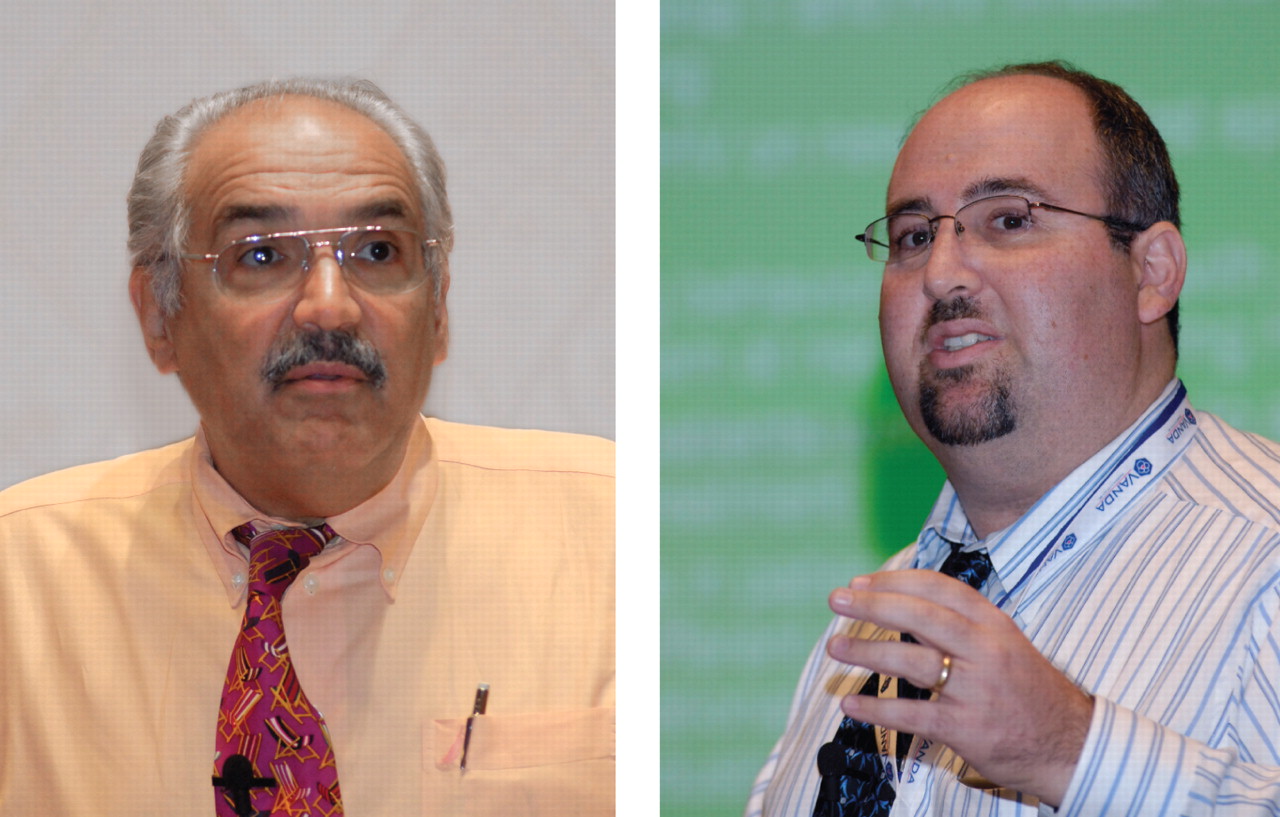CNS Sequelae May Appear Early in HIV Infection

The clinical symptoms of HIV may at first seem like major depression or classic subcortical dementia, said Francisco Fernandez, M.D. (left), who spoke, along with Mordecai Potash, M.D., at APA's Institute on Psychiatric Services in October.
Credit: Ellen Dallager
The mental health consequences of HIV infection, recognized since the early days of the epidemic, are still not entirely known, two psychiatrists said at APA's Institute on Psychiatric Services in New Orleans last month.
Epidemiological studies suggest that up to 60 percent of people infected with HIV will also experience at least one major psychiatric disorder during the course of infection.
Understanding how HIV infection disrupts the central nervous system has grown steadily over the last two decades, but the psychiatric consequences will also grow more prominent in the future as life expectancy for HIV/AIDS patients increases with better treatments, said Francisco Fernandez, M.D., and Mordecai Potash, M.D.
Early in the course of the epidemic, many scientists thought that neurocognitive effects would crop up overnight, compromising the ability of HIV-infected individuals working in critical fields such as health care, engineering, or the armed forces to do their jobs, said Potash, an associate professor of clinical psychiatry at Tulane University School of Medicine. Paradoxically, the common wisdom also held that central nervous system (CNS) symptoms occurred only after the individual progressed from HIV infection to clinically manifested AIDS.
However, that is not always the case, said Fernandez, professor and chair of the Department of Psychiatry and Behavioral Medicine and director of the Institute for Research in Psychiatry at the University of South Florida School of Medicine.
“HIV invades the CNS early in the infectious process, and psychiatric manifestations may be subtle or profound,” said Fernandez, who is chair of the APA Committee on AIDS and a member of the Psychiatric News Editorial Advisory Board. “The acute stage of the initial infection, during the first three to six weeks, may produce cognitive or psychotic symptoms but not a decrement in function.”
The risk factors run in both directions, said Potash. Not only can HIV affect the brain, but people with psychotic illnesses may underestimate their risk of infection or engage in risky behaviors that increase their chance of contracting HIV.
The effects of HIV infection occur in at least four ways. The virus may invade and damage CNS cells directly. Viral yield is low in neurons but higher in macrophages, microglia, astrocytes, or other support cells. Acting indirectly, the virus can also activate an immune cascade that can harm neurons secondarily. Finally, the immunosuppressive action of the infection can open the door to numerous infectious diseases such as toxoplasmosis, cryptococcal meningitis, tuberculous meningitis, HSV1 encephalitis, and primary CNS lymphoma.
In the earliest, asymptomatic stage, abnormalities may show up in cognitive abilities evaluated during neuropsychiatric testing but not necessarily as impairments in clinical or role functioning.
As infection proceeds to the early symptomatic stage, both tests and clinical observation provide evidence of declining function. Careful medical and neurobehavioral evaluation can help rule out primary—and treatable—nervous system diseases.
A National Institute of Mental Health consensus conference in 1989 declared that “significant impairment” occurs when tests of speed of information processing, verbal memory, or other nonlanguage tests fall two standard deviations below the mean of an HIV-negative subject. That cutoff, however, does not imply either a clinical disorder or that a dementing syndrome is present, Fernandez explained.
However, in late symptomatic infection, CNS impairment may occur in up to 60 percent of patients, either as minor cognitive-motor disease or as HIV-1-associated dementia.
The clinical presentation of HIV in the CNS resembles classic subcortical dementing processes: motor impairment, cognitive disturbance, and a predominance of apathy over depression, said Fernandez.
“This early presentation of HIV-1-associated dementia may look like major depressive disorder, with symptoms like lethargy and social withdrawal, forgetfulness, poor concentration, an unsteady gait, and difficulty with once-familiar tasks,” he said.
Antiretroviral treatment—sometimes with “industrial-grade doses”—may not only reduce symptoms “below the neck” but also help with CNS function, especially if started early to minimize CNS damage. Other drugs may be effective, too. Methylphenidate, for example, can improve reaction time and performance tasks and aid memory, although it should be avoided in patients with a history of psychotic symptoms or seizures, said Fernandez.
Potash also suggested caution in the use of antipsychotic drugs for patients with HIV.
“The destruction by the virus of cells in the basal ganglia appears to prime the brain for increased extrapyramidal side effects following use of typical antipsychotics,” he said. “I suggest using atypical antipsychotics as first-line therapies, starting with low doses. Treat patients for as short a time as possible—only as long as symptoms persist.”
Knowledge of the interplay between HIV and psychosis is still incomplete and is likely to change quickly as research in neuropsychiatry, pharmacology, and infectious diseases progresses, said Potash. The work of individual psychiatrists with even one or two patients can contribute to this development and stimulate research if communicated to the field through case reports to journals, he concluded. ▪



